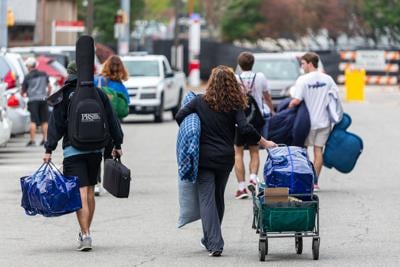NC State University Housing sent students home twice in 2020 — once in March, at the onset of the COVID-19 pandemic, and again in August, after cases spiked on and off campus. Students received refunds for the time they didn’t spend on campus, but it came at a steep price for the housing department: $23.6 million.
“The spring of 2020 saw $9 million lost in revenue in the form of refunds,” said Charles Maimone, vice chancellor for finance and administration. “In the spring, we had already made some decisions about housing for people who had already paid, so we refunded a portion for students who had already left. In the fall of 2020, $14.6 million is the total amount lost.”
Although University Housing lost more money in the fall semester than in the spring, refunds were harder to make in March. At that point in the semester, students’ money had already been used for programming, events, trips and more.
According to Donna McGalliard, the executive director of University Housing, refunds nearing the end of the fiscal year — which ends on June 30 — were much more detrimental to the department.
“From a budgetary perspective, we had spent a lot of the money that had been coming in from the fiscal year 2019-2020,” McGalliard said. “When you think about giving refunds at that point of the year, when you’ve already been spending money on programming and events and trips and all these things that students get to participate in, that was really hard.”
According to Maimone, when it comes to rebuilding the revenue lost by University Housing, the housing department stands on its own legs as a self-supporting auxiliary enterprise. This means that the major loss in housing revenue doesn’t financially impact other departments, except for the ones that exist within the housing enterprise.
Additionally, Maimone said housing is required to carry a three-month reserve for maintenance and unexpected repairs. McGalliard called this reserve a “rainy-day fund” of sorts, in the case of capital project expenses or a catastrophic event. The pandemic seemed to fit the bill.
“Whatever the case may be, it’s almost like a savings account,” McGalliard said. “We were able to use some of that reserve account to offset this $14.6 million that we refunded in the fall, and then we reduced a lot of operations.”
Along with the reserve, University Housing received federal aid thanks to the Coronavirus Aid, Relief, and Economic Security (CARES) Act, which was signed into law on March 27, 2020. The relief bill included $8.9 million for student aid and another $17 million through the Higher Education Emergency Relief Fund, which allowed the University to offset expenditures, such as the lost revenue in the housing department.
Despite the large loss in revenue, University Housing has not had to pull money from any other NC State department as a self-supporting enterprise. All of the funds they’ve relied on have been from the reserve and the CARES Act.
“The money that we bring in through student rent is what supports everything in our department,” McGalliard said. “I think that we have been able to do a lot with a lot less, as the result of really looking for cost-saving [solutions] and with assistance from the University, without any impact to money or budgets from other departments.”
The aforementioned “cost-saving” ventures include downsizing housing department staff and slashing housing expenses. With only about 4,000 students on campus, as opposed to the usual 9,000 or so, University Housing has greatly reduced their operations.
Many student positions are no longer required and were eliminated due to fewer students on campus, Maimone said. Service contracts and supply stocks were also adjusted to offset the revenue loss.
According to McGalliard, University Housing is not the only department that’s been impacted by lack of students on campus — other services that rely on on-campus residents have been heavily influenced in terms of staff and budget, like dining.
Despite the trials and tribulations that University Housing has experienced over the past year, McGalliard stressed that the department works as hard as possible to ensure that the fiscal troubles housing has weathered will impact students as little as possible.
“The bottom line is that we’re trying to make it as least impactful to the student experience as possible and, obviously, trying to take care of our staff,” McGalliard said. “We work really, really closely not only with the leadership of [the Department of Academic and Student Affairs] but the leadership of the budget office to make sure we’re all singing off the same sheet of music.”



(0) comments
Welcome to the discussion.
Log In
Keep it Clean. Please avoid obscene, vulgar, lewd, racist or sexually-oriented language.
PLEASE TURN OFF YOUR CAPS LOCK.
Don't Threaten. Threats of harming another person will not be tolerated.
Be Truthful. Don't knowingly lie about anyone or anything.
Be Nice. No racism, sexism or any sort of -ism that is degrading to another person.
Be Proactive. Use the 'Report' link on each comment to let us know of abusive posts.
Share with Us. We'd love to hear eyewitness accounts, the history behind an article.